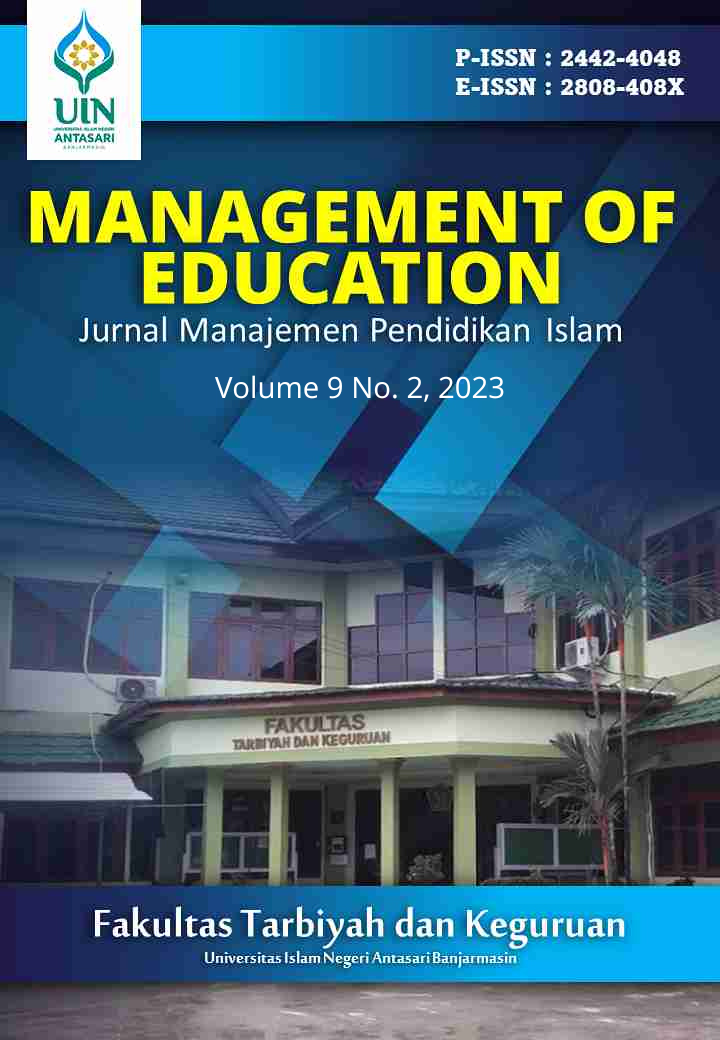ANALISIS SWOT DALAM PENGELOLAAN WAKAF PRODUKTIF BERBASIS BISNIS DI PONDOK PESANTREN DARUNNAJAH
DOI:
https://doi.org/10.18592/moe.v9i2.9984Keywords:
Productive Waqf, business, SWOT Analysis, DarunnajahAbstract
In the midst of social and economic challenges faced by Indonesian society today, waqf institutions play a crucial and strategic role. Waqf, as a form of Islamic philanthropy, has significantly contributed to the development of mosques, schools, study circles, hospitals, orphanages, Islamic boarding schools, and other Islamic educational and social institutions. Waqf has two dimensions, serving as an act of worship towards Allah and a means of facilitating transactions among humans. One of the social functions of waqf is its ability to provide positive impacts on society at large when managed productively and optimally. Pondok Pesantren Darunnajah serves as an example of an educational institution that has successfully implemented productive and dynamic business-based waqf, adapting to the movements and conditions of human civilization. This study aims to analyze the management of productive business-based waqf in Pondok Pesantren Darunnajah through a SWOT analysis. A mix method approach is employed, utilizing SWOT analysis as a tool to identify factors that formulate institutional strategies. Data for this research was obtained through interviews and questionnaires administered to relevant parties in Pondok Pesantren Darunnajah. The findings indicate that the management of productive business-based waqf in Pondok Pesantren Darunnajah holds great potential and opportunities. The implementation of productive waqf falls within the growth-oriented strategy quadrant, allowing the utilization of existing strengths to seize various development opportunities in the future.References
Dewi Sri Indriati, Urgensi Wakaf Produktif Dalam Pembangunan Ekonomi Masyarakat, (Ilmiah al-Syir’ah, 2017) p.96.
Resfa Fitri dan Heni P Wilantoro, “Analisis Prioritas Solusi Pengelolaan Wakaf Produktif”, dalam Jurnal Al-Muzara’ah, Vol. 6 No. 1 2018.
Khusaeri, Wakaf Produktif, (al-‘Araf : Jurnal Pemikiran Islam dan Filsafat, 2015).
Abdullah Ubaid, Kemitraan Nazhir Dengan Bank Syariah Dalam Mengembangkan Wakaf Uang: Studi Perbandingan Di Indonesia, Bangladesh Dan Yordania, Kuriositas, 2015.
Freddy Rangkuti, Teknik Membedah Kasus Bisnis Analisis SWOT, Cet, 24 (Jakarta: Gramedia Pustaka Utama, 2018).
Rachmat, Manajemen Strategik, (Bandung: Pustaka Setia, 2014).
John W. Creswell, Research Design: Pendekatan Kualitatif, Kuantitatif dan Mixed (Edisi III; Yogyakarta: Pustaka Pelajar, 2010).
Ismail Nawawi Uha, Metode Penelitian Kualitatif Teori dan Aplikasi Interdisipliner Untuk Ilmu Sosial, Ekonomi/ Ekonomi Islam, Agama, Manajemen, dan Ilmu Sosial Lainnya, (Jakarta: CV. Dwiputra Pustaka Jaya, 2012).
Hadiyanto Arief, Unfolding the Hidden Curriculum, cet. II, Jakarta: Pondok Pesantren Darunnajah Press, 2022.
Erwin Suryatama, Lebih Memahami Analisis SWOT dalam Bisnis, (Surabaya: Surya Pena, 2004).
Downloads
Published
How to Cite
Issue
Section
License
Authors who publish with this journal agree to the following terms:
- Authors retain copyright and grant the journal right of first publication with the work simultaneously licensed under a Creative Commons Attribution 4.0 International that allows others to share the work with an acknowledgement of the work's authorship and initial publication in this journal.
- Authors are able to enter into separate, additional contractual arrangements for the non-exclusive distribution of the journal's published version of the work (e.g., post it to an institutional repository or publish it in a book), with an acknowledgement of its initial publication in this journal.
- Authors are permitted and encouraged to post their work online (e.g., in institutional repositories or on their website) prior to and during the submission process, as it can lead to productive exchanges, as well as earlier and greater citation of published work.









 This work is licensed under a
This work is licensed under a 